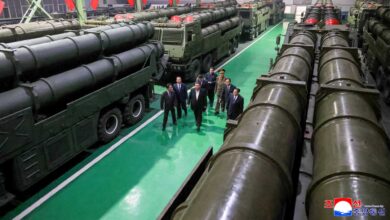On October 25, 2002, General Kim Jong Il visited the Changsong Foodstuff Factory.
His first question was about the supply of raw materials.
An official answered that the factory was using wild fruits available in Changsong County, such as wild grapes, omija, tara vine and hawthorn fruits, adding that they had procured 600 tons of acorns for the year.
Kim Jong Il was satisfied with the reply.
He cast a glance round the factory, when a chart in the yard met his eyes.
He asked, “What is that chart?”
Another official said proudly that it was a flow chart showing the lines for production of condiments, noting that they had newly set up a workteam for the purpose.
Kim Jong Il said that he could not understand how the factory was producing condiments, before asking what the workteam was producing.
The official replied that it was producing bean paste, soy sauce and bean oil.
“Where do you get soya beans for the production of bean paste, soy sauce and bean oil?” asked Kim Jong Il.
A senior official of the county answered that some were locally available and 20 tons had been supplied by the province.
It is not wise to set up the lines for production of condiments in such a mountainous region as Changsong County where sufficient supply of soya beans could not be guaranteed, observed Kim Jong Il.
He went on: Changsong County is in a mountainous region with a limited area of arable land. In such counties it would be difficult, however hard they may try, to ensure enough supply of soya beans for the operation of the above-said production lines. I do not understand what guarantee the factory had in setting up those lines in this county. It does not suit the local conditions of Changsong County to build the production lines fed by soya beans, instead of those which rely on the abundant supply of wild fruits. …
Kim Jong Il resumed, “President Kim Il Sung called mountains in Changsong County ‘gold mountains’ because it has an abundance of wild grapes, tara vine fruits, wild pears and other necessary materials to feed local industry factories. There are no beans in the ‘gold mountains.”

